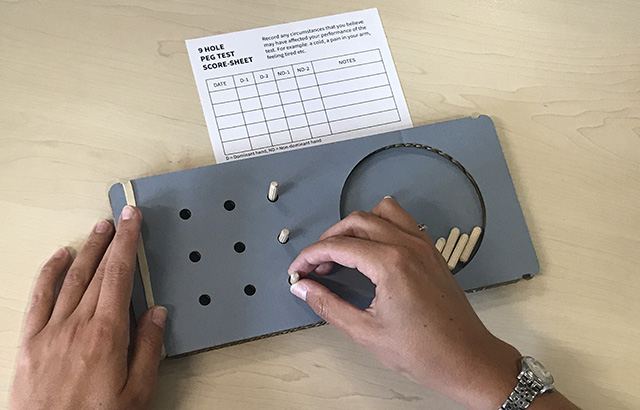First clinical trial to recognise the needs of severely disabled MS patients

A new clinical trial testing a disease-modifying drug for multiple sclerosis (MS) will be the first in the world to recognise the importance of wheelchair users retaining the use of their hands.
The team from Queen Mary University of London, Barts Health NHS Trust and pharmaceutical company Roche, hope that the study will make lasting changes in a field that has previously only looked at a patient’s walking ability when assessing the potential of MS drugs.
MS is a degenerative disease of the central nervous system affecting approximately 120,000 people in the UK and 700,000 people in Europe, of which around 96,000 have the highly disabling primary progressive form.
Until now, clinical trials involving people with MS have focused on whether or not the drugs being tested preserve the ability to walk, rather than preserve the use of their hands. For example, if the person relies on a wheelchair, they have been excluded from participating in trials in the past.
Additionally, the NHS in the UK stops treatment with disease-modifying therapies for people who lose lower limb function and rely on a wheelchair, and the European Medicines Agency has also been an obstacle to those patients from participating in this type of research in the past. This is despite growing evidence that continuing treatment may delay worsening of their hand and arm function, which could dramatically improve quality of life.
Lead researcher Professor Gavin Giovannoni from Queen Mary University of London and Barts Health NHS Trust said: “Addressing the needs of people with progressive MS, who are typically more advanced in their disease course, is one of the major frontiers in MS research. Around a third of people living with progressive MS may already be confined to a wheelchair, so maintaining hand and arm function is essential for them to stay independent and lead active lives.”
The new international study, starting by the end of 2018, will evaluate the long-term safety and efficacy of the drug ocrelizumab by enrolling approximately 1,000 people with primary progressive MS across multiple countries. This will include people with more advanced disability, and those who need a wheelchair, where use of hands and arms is critical.
For the first time ever, the Nine-Hole Peg Test* — a measure of arm, wrist and hand function — will be used as the main outcome to be measured in the trial. In the test, participants take pegs from a container, and one by one, place them into nine holes on a board, as quickly as possible. They then remove the pegs from the holes, one by one, and replace them back into the container.
By comparing how well patients who are given the drug ocrelizumab perform in this test, to those patients who are given a placebo, the team hope to be able to assess whether ocrelizumab may offer hope to patients by allowing them to retain their upper limb function.
Patrick Burke, a patient with advanced MS said: “The ability to use my hands and arms is now very important for a multitude of reasons. Without them I could not use a rollator, walker or mobility scooter.”
Professor Giovannoni added: “For a number of years, through our #ThinkHand campaign, we have been urging industry to conduct a study looking at upper limb function in people with advanced MS. We’re pleased that in collaboration with Roche, we will conduct a clinical trial that uses hand function as a primary outcome for the first time.”
